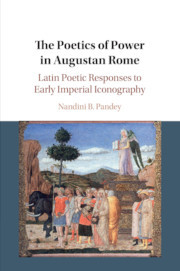Description
The Poetics of Power in Augustan Rome
Latin Poetic Responses to Early Imperial Iconography
Author: Pandey Nandini B.
Explores the dynamic interactions among Latin poets, artists, and audiences in constructing and critiquing imperial power in Augustan Rome.
Language: English
Subject for The Poetics of Power in Augustan Rome:
Approximative price 34.17 €
In Print (Delivery period: 14 days).
Add to cart
The Poetics of Power in Augustan Rome
Publication date: 08-2020
Support: Print on demand
Publication date: 08-2020
Support: Print on demand
Approximative price 107.81 €
In Print (Delivery period: 14 days).
Add to cart
The Poetics of Power in Augustan Rome
Publication date: 10-2018
314 p. · 15.8x23.5 cm · Hardback
Publication date: 10-2018
314 p. · 15.8x23.5 cm · Hardback
Description
/li>Contents
/li>Biography
/li>
Augustus' success in implementing monarchical rule at Rome is often attributed to innovations in the symbolic language of power, from the star marking Julius Caesar's deification to buildings like the Palatine complex and the Forum Augustum to rituals including triumphs and funerals. This book illuminates Roman subjects' vital role in creating and critiquing these images, in keeping with the Augustan poets' sustained exploration of audiences' active part in constructing verbal and visual meaning. From Vergil to Ovid, these poets publicly interpret, debate, and disrupt Rome's evolving political iconography, reclaiming it as the common property of an imagined republic of readers. In showing how these poets used reading as a metaphor for the mutual constitution of Augustan authority and a means of exercising interpretive libertas under the principate, this book offers a holistic new vision of Roman imperial power and its representation that will stimulate scholars and students alike.
1. The mutual constitution of Augustus; 2. History in light of the Sidus Iulium; 3. Questioning consensus on the palatine; 4. Remapping the Forum Augustum; 5. The triumph of the imagination; 6. The last word?
Nandini B. Pandey teaches Classics at the University of Wisconsin, Madison. Her research centers on Latin literature, its historical and cultural contexts, and its postclassical reception. She has published in Transactions of the American Philological Association, The International Journal of the Classical Tradition, Vergilius, Classical Philology, Classical World, The Classical Journal, and Eidolon.
© 2024 LAVOISIER S.A.S.




